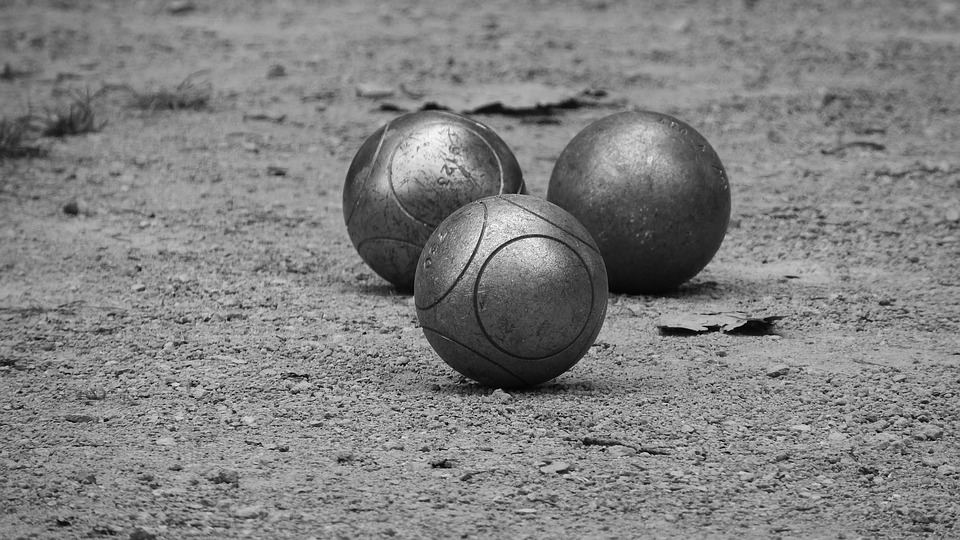SCORES & OUTDOORS – Pétanque: the most interesting game of which no one ever heard

Pétanque is played with steel balls, called boules – which is French for balls.
 by Roland D. Hallee
by Roland D. Hallee
On March 28, while attending the Mid-Maine Chamber of Commerce Business to Business Showcase, held at Colby College, in Waterville, I met a gentlemen named Raymond Fecteau. He began telling me about this game that he has organized locally, and for which he helped secure funding in Augusta, to build courts.
The game is called Pétanque, a sport that falls in the category of boules sports, which include bocce and lawn bowling. A popular sport in Europe, it is not widely played in the United States. According to the Federation of Pétanque USA, approximately 30,000 people play nationwide.
Where bocce and lawn bowling are usually played with wooden balls, pétanque is played with steel balls, called boules – which is French for balls.
The current form of the game originated in 1907 in La Ciotat, France. The French name, pétanque, borrowed into English, comes from petanca in the Provencal dialect of the Occitan language, meaning “feet fixed” or “feet planted.”
The history of pétanque can be traced back to the ancient Greeks who played a game using stones, and was brought to France by the Romans.
Pétanque is a social, low impact game that is all inclusieve and can be played by literally everyone from grandparents to adolescent to the handicapped. If you can hold a ball in your hand and move your arm in a pendulum motion, you can play.
Games can be played head to head or in team competitions. The object of the game is to get as close to the cochonnet (jack) as you can, hitting your opponent’s ball or the jack in the process, if necessary. Every shot is fair play as long as the boule is thrown from the circle.
The games are normally played on hard dirt or gravel.
Before the mid-1800s, European boules games were played with solid wooden balls, usually made from boxwood root, a very hard wood. Following World War I, cannonball manufacturing technology was adapted to allow the manufacture of hollow, all-metal boules. The first all-metal boule, la Boule Intégrale, was introduced in the mid-1920s. Shortly thereafter, a process was developed for manufacturing steel boules by stamping two steel blanks into hemispheres and then welding the two together to create a boule. With this technological advance, hollow, all-metal balls rapidly became the norm.
To begin, a coin is tossed and the winner (Team A) begins play. They select the court, draw the circle and the captain of the team will step into the circle and tosses the jack. The jack must be tossed no less than 20 feet and no more than 32 feet. All subsequent play is done from inside the circle and the player must stay in the circle until their thrown ball touches the ground.
A player from team A then tosses their first boule. Next, a player from team B attempts to place their boule closer to the jack. The boule nearest the jack is said to be holding the point. The team holding the point does not play until their opponents take the point position. Once a team has used up their boules the opposing team then plays their remaining boules.
Points are then counted allowing one point for each boule closer to the jack than the opponent’s closest boule. After the points are counted the “end” is over.
The winning team then begins a new end by drawing a circle around the jack where the last end finished. The game ends when one team has reached 13 points.
The Pétanque courts in Augusta are located at Mill Park, where the city allowed the courts to be built. Fecteau raised $50,000 in order to construct the courts and accompanying structures. It is also set up to play day or night. Playing times are generally on Tuesdays and Saturdays.
For more information about the game, or how you can join the fun, you may contact Fecteau at 622-3389, or ray7275@gmail.com.
Roland’s trivia question of the week:
Name the only NFL team to have scored three touchdowns in less than a minute.
Responsible journalism is hard work!
It is also expensive!
If you enjoy reading The Town Line and the good news we bring you each week, would you consider a donation to help us continue the work we’re doing?
The Town Line is a 501(c)(3) nonprofit private foundation, and all donations are tax deductible under the Internal Revenue Service code.
To help, please visit our online donation page or mail a check payable to The Town Line, PO Box 89, South China, ME 04358. Your contribution is appreciated!


Leave a Reply
Want to join the discussion?Feel free to contribute!